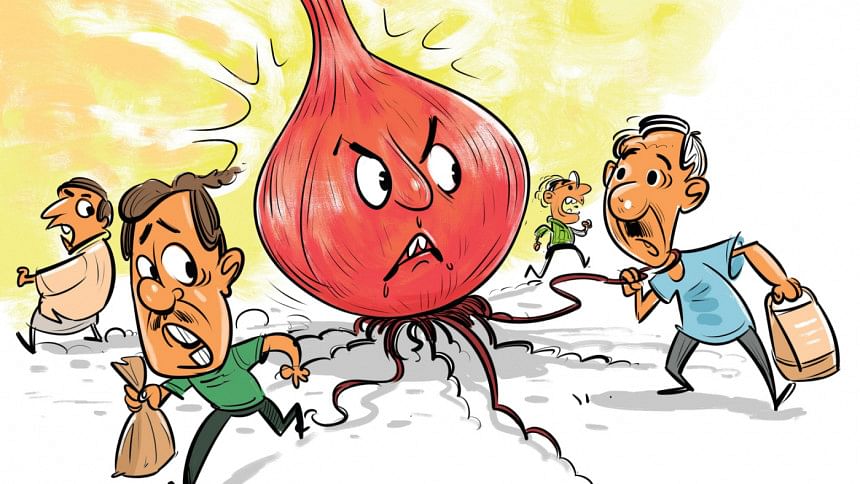Onions should not make you cry

When things hit rock bottom humans have a tendency to find ways to laugh at them. It is related to that ambivalence of a bizarre event when you don't know whether to laugh or cry. When it comes to onions selling for Tk 120 per kg the first instinct is to want to cry and this is not the kind of involuntary crying while slicing onions, which in this particular instance would be a welcome situation. Welcome as it would mean you could afford the onions to cry while cutting them, which is no laughing matter.
No, this crying is one of utter despair that one of the most important spices in our cuisine that gives that essential kick and flavour to our bhaji, bhorta, salads, dopiaza, byriani, etc., would cost as much as half a chicken! Right after getting over the shock of such outrageous onion inflation people of course started making fun of the whole thing, as we inevitably do when there's nothing we can do about anything. One elderly woman, a cook, joked that her daughter-in-law called in panic a few days ago announcing the unbelievable price of onion as if the ultimate apocalypse was imminent. The mother-in-law, wizened and jaded by years of experience and many an onion crisis retorted with a sardonic laugh: "cook the meals without onion".
Which, one thinks, is not a bad idea. Why, after all, cry about a mere vegetable/spice when there are so many other far more crucial food items to feel devastated about? Like rice, our staple, for instance—with farmers not getting a fair price for their rice because some sneaky middlemen always beat them to it, buying the rice for cheap and then selling to the government at a higher price. Thus we have the irony of the very people who grow our rice and abundant amounts of it, going hungry because of the knavery of a few. So plenty to cry about there.
But can we really just forget about the grief onions or rather the lack of them have caused? Though this time much of the crisis in supply was because India, which supplies a large portion of the market (because we can't grow enough to meet the demand), was itself in a bind because of low yields. But besides that, there are those terrible traders who have hoarded the onions to hike up the prices which have caused many onion lovers to feel like a good bawling session.
Thankfully it seems our government is trying to solve the matter by importing from other countries including Myanmar for reasons unfathomable.
Yet one cannot help but think perhaps we should not be so obsessed with certain food items that are not in the category of making all the difference between being adequately fed and going hungry like in the case of rice.
During Ramadan despite all the warnings and threats by the government, prices of essentials will go over the moon. Yes, onions again will dominate the news for being so wanted and so pricey, along with green chillies—the paracetamol of all spices in the South Asian region. And again it is because some greedy traders will create an artificial crisis and hike up the prices knowing that rain, hail or storm, the Bangladeshi can never let go of his/her piaju and jhaal muri during Ramadan no matter how bad the heartburn or flatulence.
So what if we just boycotted these spices every time they are unfairly priced? Such a suggestion may be taken as blasphemy for some people who think life just cannot go on without onions and chillies. But before we get all fired up by the lack of fiery spices, let's take a chill pill and at least consider this somewhat-radical move. It would send a message to those unscrupulous traders and middle men that you cannot mess with us anymore and so force them to bring down the prices to avoid large scale losses. It would also give us a chance to be a little more flexible about our taste buds and make us more resilient about our food habits.
Admittedly, onions are beautiful as are green chillies and give enticing aroma to our food, not to mention all the health benefits they provide. But the next time they are priced like luxury items, no need to cry over them.
Aasha Mehreen Amin is Senior Deputy Editor, Editorial and Opinion, The Daily Star.

 For all latest news, follow The Daily Star's Google News channel.
For all latest news, follow The Daily Star's Google News channel. 








Comments